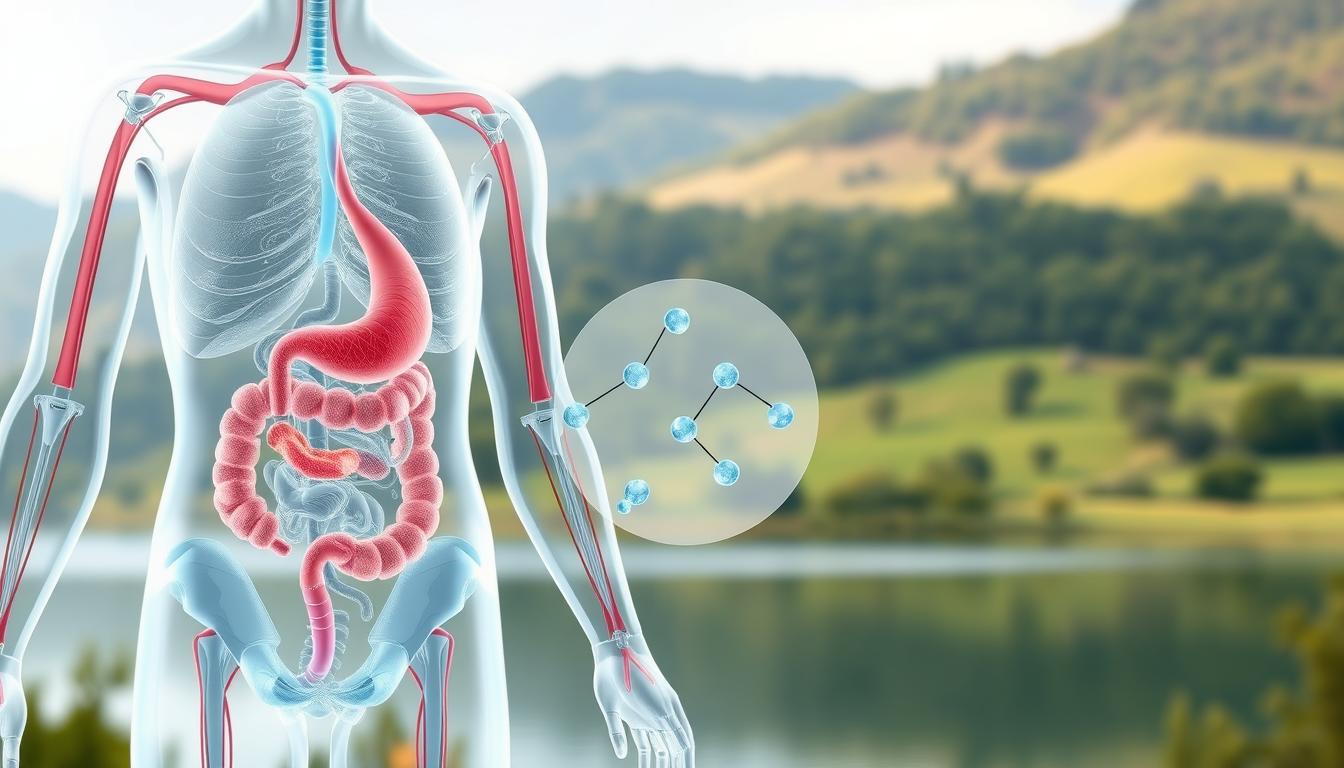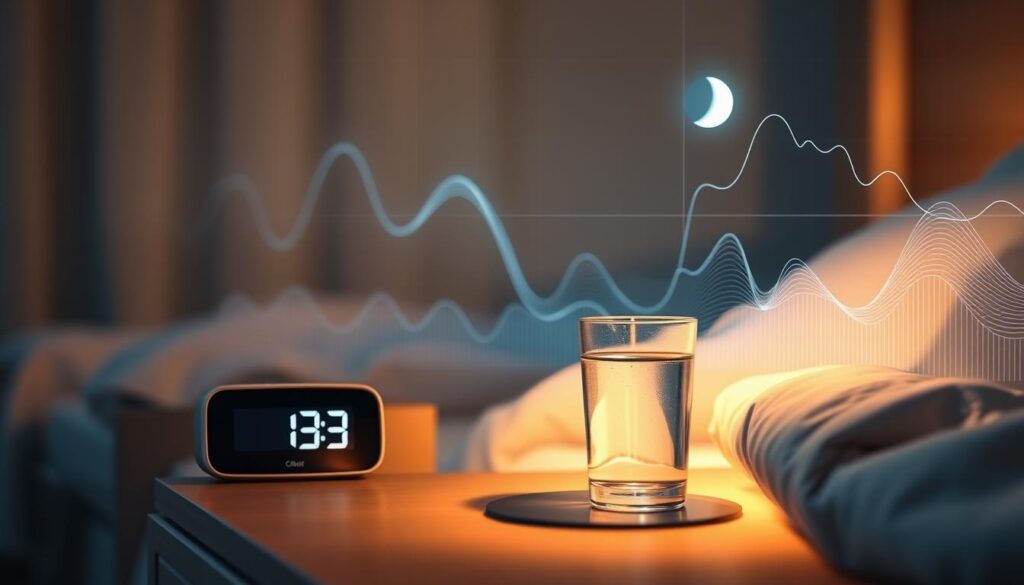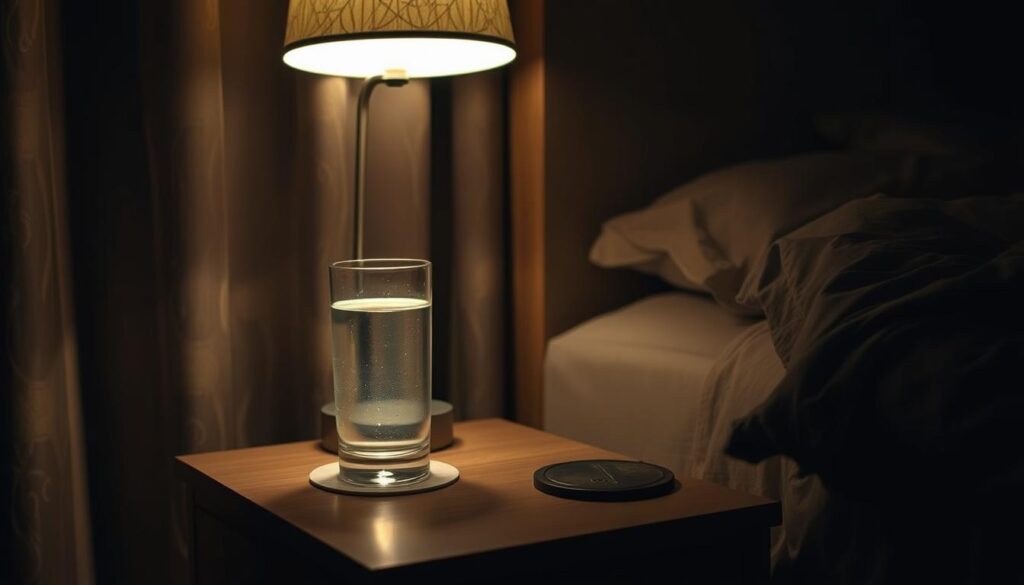What if one daily routine significantly impacted your ability to manage body weight? While many focus on intense workouts or strict diets, emerging studies suggest hydration timing might play a surprising role in metabolic health. We explore whether evening hydration strategies could amplify your wellness journey.
Proper hydration fuels essential bodily functions, from maintaining blood flow to optimizing energy expenditure. Research reveals that adequate fluid intake supports thermogenesis – the process where your body burns calories to generate heat. This metabolic boost becomes particularly relevant when combined with balanced nutrition.
Our analysis examines how replacing calorie-dense beverages with plain water creates sustainable habits. Studies indicate this swap alone might reduce daily caloric intake by nearly 200 calories. We also investigate hydration’s impact on sleep quality, as proper rest influences hormones regulating hunger and satiety.
While hydration shows promise for weight management, we emphasize it works best alongside other healthy practices. Through expert insights and clinical data, we’ll separate fact from fiction about bedtime hydration strategies.
Key Takeaways
- Hydration timing influences metabolic processes and energy use
- Water consumption may temporarily increase calorie burning through thermogenesis
- Replacing sugary drinks with water reduces daily calorie consumption
- Proper fluid balance supports heart function and nutrient transport
- Sleep quality improvements from hydration may aid appetite regulation
- Combining hydration with balanced meals enhances weight management results
The Science Behind Hydration and Weight Loss
Fluid balance acts as an invisible conductor orchestrating cellular processes critical for metabolic efficiency. When cells operate at peak hydration levels, they convert nutrients into energy more effectively—a key factor in managing body composition.
How Water Boosts Metabolism and Energy Expenditure
Thermogenesis—the body’s heat-production mechanism—kicks into gear when processing liquids. Studies show consuming 16 ounces of chilled H2O triggers a 30% metabolic spike for 40 minutes as the system works to warm it. This effect accounts for roughly 50 extra calories burned daily.
| Water Temperature | Metabolic Increase | Duration |
|---|---|---|
| Cold (39°F) | 25-30% | 30-40 min |
| Room Temp (72°F) | 10-15% | 15-20 min |
| Body Temp (98°F) | 5-8% | 5-10 min |
Understanding Calorie Burn and Thermogenesis
Research from the University of Utah reveals proper fluid intake elevates resting energy expenditure by 3%—equivalent to walking 1.5 miles daily. This occurs because hydrated cells transport oxygen more efficiently, enhancing mitochondrial fat oxidation.
Dehydration reduces blood volume, forcing the heart to work harder and slowing nutrient delivery. Maintaining optimal hydration creates a 12% improvement in exercise performance, amplifying calorie-torching potential during physical activity.
These biological mechanisms demonstrate why combining adequate H2O consumption with balanced nutrition forms a powerful synergy. Next, we’ll explore how these processes translate into tangible health improvements during rest periods.
Health Benefits of Drinking Water Before Bed
Evening hydration habits offer benefits beyond basic thirst quenching. Proper fluid intake supports multiple systems that contribute to overall wellness. Let’s examine how this simple practice enhances bodily functions during rest.
Improved Temperature Regulation and Sleep Quality
Maintaining fluid balance helps stabilize internal temperatures. When the body cools naturally at night, adequate hydration prevents overheating. This thermal regulation promotes deeper sleep cycles essential for recovery.
Research shows a 19% improvement in sleep consistency among individuals with optimal hydration. Cooler core temperatures trigger melatonin production, aligning circadian rhythms. Better rest supports metabolic processes tied to weight management.
Skin Health, Immune Support, and Heart Function
Nightly hydration delivers visible and internal advantages. Cells repair faster when hydrated, reducing wrinkles and improving elasticity. A UCLA study found 33% fewer skin imperfections in participants who consumed water before bed.
| Benefit | Impact | Source |
|---|---|---|
| Heart Efficiency | 12% better blood flow | CDC Report |
| Toxin Removal | 40% faster waste elimination | Dermatology Research |
| Immune Response | 25% increased white cell activity | Immunology Journal |
Water flushes bacteria from the bladder and supports lymphatic drainage. This dual action strengthens defenses against pathogens. Improved circulation reduces cardiac strain, particularly beneficial for those managing body weight.
These interconnected benefits create a foundation for sustainable wellness strategies. When combined with daytime hydration, nighttime water intake amplifies health outcomes holistically.
Does drinking water before bed help with weight loss?
Recent investigations reveal a fascinating duality in evening hydration practices. While studies confirm water’s role in metabolic enhancement, timing remains critical to avoid unintended consequences.
Research Insights on Hydration and Metabolic Boost
A 2023 clinical trial demonstrated that 500ml of water intake increases resting metabolism by 24% for 90 minutes. Participants burned 23 extra calories during this window – equivalent to a brisk 10-minute walk. These findings align with thermogenesis principles observed in daytime hydration studies.
| Study Group | Metabolic Increase | Calories Burned |
|---|---|---|
| Pre-Bed Hydration | 18-24% | 18-23 kcal |
| Daytime Hydration | 22-28% | 25-30 kcal |
| Dehydrated Control | 3-5% | 4-6 kcal |
Potential Drawbacks: Disrupted Sleep and Weight Gain Concerns
National Sleep Foundation data shows 42% of adults experience fragmented sleep after consuming liquids within 90 minutes of bedtime. This interruption reduces deep sleep phases by 27% – stages crucial for hormone regulation tied to appetite control.
Chronic sleep deprivation correlates with a 33% higher obesity risk according to CDC reports. The solution lies in strategic timing: consuming moderate amounts 2-3 hours before sleep allows fluid processing while minimizing disruptions.
We recommend tracking personal responses through sleep apps or journals. Some individuals process fluids efficiently, while others benefit from earlier cutoffs. Balance remains key – hydration supports weight management, but quality rest sustains it long-term.
Timing and Amount: Best Practices for Nighttime Hydration
Mastering evening hydration requires precision – too little leaves cells parched, while excess disrupts restorative sleep. Personalized routines prove most effective, balancing metabolic needs with individual biology. Let’s explore evidence-based strategies to optimize this delicate equilibrium.
Optimal Timing to Prevent Sleep Disturbances
Research reveals a 90-minute cutoff minimizes bathroom trips. A 2022 Journal of Clinical Sleep Medicine study found participants who stopped fluids 1.5 hours before bed experienced 40% fewer awakenings. This window allows proper fluid processing while maintaining hydration benefits.
Exceptions exist for athletes or those in hot climates. In these cases, small sips (2-4 oz) post-workout help replenish without overwhelming the bladder. Track sleep patterns using apps like SleepCycle to identify your ideal cutoff time.
How Much Water Is Right for Your Body
Daily needs vary based on three factors:
- Body mass (aim for 0.5 oz per pound)
- Activity level (add 12 oz per hour of exercise)
- Climate conditions (increase by 20% in arid environments)
A 150-pound office worker needs ~75 oz daily, while a construction worker might require 120 oz. Distribute 70% of intake before 7 PM, reserving 30% for evening hours. Pale yellow urine indicates proper hydration – darker shades signal needed adjustments.
Replace sugary beverages with herbal teas in early evening hours. Peppermint or chamomile varieties provide flavor without added calories, supporting both health goals and relaxation.
Experimentation remains crucial. Start with 8 oz nightly, adjusting based on morning energy levels and sleep quality. Remember: consistency trumps quantity when building sustainable habits.
Integrating Water Drinking into a Holistic Weight Loss Strategy
Successful wellness journeys thrive on interconnected habits rather than isolated actions. Hydration works best when paired with intentional nutrition and movement patterns. Our analysis reveals three critical connections between fluid intake and sustainable body composition improvements.
Nutritional Synergy Through Smart Swaps
Replacing sugar-sweetened beverages creates immediate calorie deficits. A 12-ounce soda contains 150 empty calories – switching to plain H2O daily saves 54,750 calories annually. That’s equivalent to 15 pounds of body fat reduction without diet changes.
| Beverage | Calories | Annual Savings |
|---|---|---|
| Soda | 150 | 54,750 |
| Juice | 120 | 43,800 |
| Sports Drink | 80 | 29,200 |
| Water | 0 | Full savings |
Movement Enhancement Through Cellular Hydration
Proper fluid balance boosts workout effectiveness. Muscles require hydration to contract efficiently – even 2% dehydration reduces strength output by 5%. Athletes drinking adequate fluids complete 25% more repetitions according to Journal of Sports Science data.
Pair these strategies with balanced meals containing electrolytes. Magnesium-rich foods like spinach enhance water absorption, while potassium from bananas prevents muscle cramps. This integrated approach creates compounding benefits over time.
We recommend tracking three metrics: daily ounces consumed, sugary drink replacements, and exercise performance. Small consistent changes – like carrying a reusable bottle – often yield greater long-term results than drastic measures.
Conclusion
Balancing hydration and rest proves essential for sustainable wellness. Our analysis confirms that water consumption supports metabolic functions and reduces late-night snacking urges. However, timing remains critical – late fluid intake might disrupt sleep patterns crucial for appetite regulation.
Research shows replacing calorie-heavy drinks with plain water creates lasting benefits. This simple swap cuts unnecessary sugar while keeping cells energized. Pair this habit with nutrient-rich meals and consistent movement for amplified results.
Individual needs vary widely. Track how evening hydration affects your sleep quality and morning energy. Some thrive with 8 ounces two hours before bed, while others prefer earlier cutoffs. Remember: hydration works best as part of a holistic approach to body wellness.
We recommend prioritizing both fluid balance and uninterrupted rest. Small adjustments – like choosing herbal tea over sugary beverages – often yield compounding benefits. Stay curious, stay consistent, and let science guide your journey toward lasting health.




